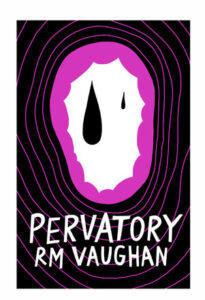
The Complicated Experience of Reading a Late Friend’s Novel
“I learned later that he had left a piece of paper with four stark words on it: ’Suicide notes are tacky.‘”
In October, I received an email from an editor at Toronto-based Coach House Books. It was a simple request for me to provide a blurb for the book jacket of the latest book by R.M. Vaughan, the brilliantly titled Pervatory.
Except there wasn’t anything simple about it: Vaughan, who I referred to as Richard, had died three years ago by suicide, during the waning-but-still-suffocating confines of the pandemic. I had no idea that he still had a book waiting to be published (nor did Coach House Press).
The editor, Alana Wilcox, explained that I wouldn’t have a lot of time as the book was due to come out in late November. Turning this down was not an option: it would be an honor to blurb this particular book, and a way for me to pay tribute to my late friend. Obviously, I was burning with curiosity about what Richard’s book would be about.
I was also wary. Richard and I had been messaging each other on October 11th, 2020, exchanging our usual gripes about the freelancing biz. We were talking about feeling like being in a rut, given the grind of the pandemic. “Fuck, I know,” he wrote. “Don’t worry about deadlines and all that, because everything is off the rails. I find it hard to concentrate on any one thing for long.”
Police in the province of New Brunswick, where Richard was finishing up a stint as a visiting writer, put out a call on October 13th. Richard was missing.
I knew this was very, very bad news. Richard suffered from anxiety and depression; we had occasionally discussed battling them. His CV was basically a 911 call: he wrote an entire book about being tortured by insomnia and wrote a play in 2018 about suicide.
But I was torn: in 2019, Richard had lost a close friend, Toronto art dealer Katharine Mulherin, to suicide. He was living in Montreal at the time, and he was gutted by the news. We spent the afternoon together. We talked about the ethics of taking one’s own life and the inevitable damage it does to those left behind. Richard also knew that he was loved by a network of friends and colleagues. It was for these reasons that despite everything I knew about Richard, I held on to hope that he was just missing and not dead.
But that terrible possibility was soon reality: Richard’s body was found a week later, dead from drowning. Lest there be any mistake about what had happened, I learned later that he had left a piece of paper with four stark words on it: “Suicide notes are tacky.” I shed tears as I cried to a final one-liner from that bastard. Even when suicidal, Richard had a wicked sense of humor.
I dove in to Pervatory.
Obviously, I was burning with curiosity about what Richard’s book would be about. I was also wary.
And that became one of the strangest and most upsetting reading experiences I’ll ever have. I could hear Richard’s voice so clearly throughout the book. The novel is essentially a twisted love letter to Berlin, a city he had spent a great deal of time in. Berlin, he had told me, was one of the few cities left where rents were cheap enough that artists, writers, and pornographers could still create vibrant neighborhoods.
There were also lots of digs against Toronto: he had dissed the Canadian metropolis many times, once telling me that it was “a hellhole run by autocratic, uptight Protestants.” He also characterized the gay men of Toronto as vacuous and materialistic: “I don’t have a boyfriend,” he once said, “because I don’t own real estate.” In the book, he has a hilarious yet crushing few lines about TO (for Toronto, Ontario) in which he ties his own fortunes to the city’s identity: “I often thought of myself as a person who had done well in life, as someone who had earned a standing in my community. I believed the Toronto lie. To be nothing is one thing, to be nothing and deluded another.”
By contrast, Berlin was a city of sexual possibilities. Richard describes any and all manner of sexcapades in Pervatory; the book lives up to its title. There are sensuous descriptions of BDSM and cascading body fluids.
There are also passages in the book in which the protagonist grapples with his father’s death, years earlier. Richard had a rocky relationship with his own late father, and all of that was dripping out of Pervatory.
The book is part mystery, part twisted romance, with elements of the supernatural. It reads like diary entries. It’s perhaps a bit choppy (the editors who put the book together acknowledge it was an unfinished work) but it’s good-choppy, and somehow works.
Richard was so good at being bitter. I felt like I was losing myself in the book, hearing his snark. I wanted to join in but of course couldn’t. It was like we were having a conversation, but I couldn’t engage. I was as if listening to an audiobook, the unmistakable distinct timbre of his voice uttering each syllable in my head.
It strikes me that the book is the perfect punctuation mark to his unusual, ambiguous, striking body of work.
There were many moments when I had to put the book down and take a walk. I was overwhelmed. I lost a number of friends during the pandemic. One died of pancreatic cancer; another keeled over after a massive coronary; another of prostate cancer. This is part of being fiftysomething, but the cumulative grief I had experienced was coming back as I soaked up Richard’s words and his obvious pain.
So many horrific ways to leave this world: cancer, AIDS, car accident. But suicide is something else entirely. That someone so creative, so full of ideas, wisdom, and humor would choose to check out is devastating. With apologies to the everything-happens-for-a-reason crowd: no, there are indeed some things in life that are profoundly meaningless.
With its description of a dead-end romance, grinding depression, and psychiatric assessments, Pervatory began to take on an existential quality, almost of Beckett proportions. That Richard died by drowning was itself literary: I suspect it was his ode to Virginia Woolf, or perhaps it was his nod to Canadian literature; in her 1972 analysis of Canlit, Survival, Margaret Atwood noted how many characters in Canuck books and films die by drowning. Maybe he was thinking of both. Here I am, looking to make something out of this: maybe he just wanted out. Suicide is that great unresolved emotional abyss.
Pervatory ends with violence and a psychiatric assessment of the protagonist (spoiler alert: he’s not well). As I finished it I was struck by the realization that this was Richard’s novel-length suicide note. Here it all is, mapped out: his emotional frailty, his unresolved issues with his father, the cruelty of unrequited love, the pharma dependency.
As jarring as reading it was, it strikes me that the book is the perfect punctuation mark to his unusual, ambiguous, striking body of work. It explains some things, but it doesn’t make sense of his suicide. It was that seeking of answers that drove me to read it, but it still left behind more questions than answers. Everything was here, yet nothing could explain suicide.
Pervatory is just like Richard’s exit from this earth: it’s something I’ll never be able to fully process. The final three words of the book are the ultimate kicker: “Raise the dead.”
________________________

Pervatory by RM Vaughan is available from Coach House Books.
Matthew Hays
Matthew Hays is a Montreal-based author who teaches film studies at Concordia University and Marianopolis College.



















